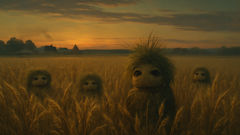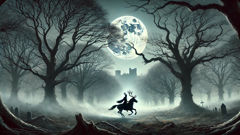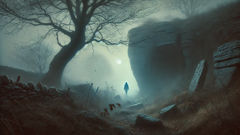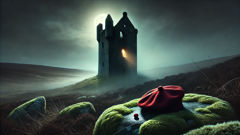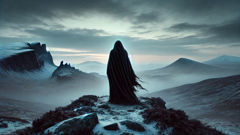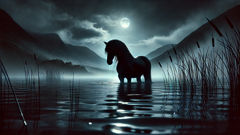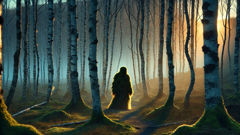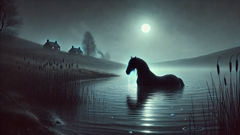Introduction
Across the endless waves of Russia’s golden steppe, where the wind whispers secrets in the swaying wheat and the horizon blurs into a pale, trembling sky, the villagers of Kamenka have always lived in careful respect of forces unseen. Here, the ancient soil remembers stories older than kings, and the roots of rye and barley twist around truths that slip between myth and memory. For centuries, as the sun blazed over the ripening fields and shadows crept between the furrows at dusk, the people believed their world was shared with beings no less real for being invisible—a hidden nation of spirits who watched, protected, and sometimes tormented those who dared forget their presence. Among these spirits, none were as unpredictable or as deeply entwined with rural life as the Polevik: the mysterious field-dwellers of Slavic legend, said to appear as dwarves with hair of wild grass, skin the color of earth, and eyes like shining black seeds. Some called them guardians, some tricksters, others omens of misfortune or harvest’s bounty, but all agreed that to cross a Polevik was to invite confusion, fever, or worse. Travelers lost their way in the midday glare, children vanished in the wheat, and sickles rusted overnight when offerings were forgotten. In Kamenka, every spring, the elders would gather the young around the smoking hearth to retell the old warnings: never walk the fields at noon or twilight, never insult the earth, and always leave a crumb of bread and a drop of kvass beneath the tallest sheaf. But in one extraordinary summer, as the world changed and the boundaries between the human and the otherworldly thinned, a young woman named Alyona would come to know the Polevik not as shadows of fear, but as living echoes of the land’s own wild spirit. This is her story—a tale of courage, mystery, and the fragile balance between people and the restless guardians of Russia’s fields.
Whispers Among the Wheat
The summer Alyona turned sixteen, the wheat rose taller than her waist, thick with promise. Her mother said it was the richest crop in a generation, yet every morning she woke with worry pricking her heart like thistles. For weeks, odd things had crept into their days: a path through the rye trampled as if by tiny feet, strange patterns burned into the barley after a thunderstorm, tools left sharp and gleaming one day and coated with rust the next. The old women whispered that such signs meant the Polevik were restless. Some said they were angry, others that they were lonely, and one toothless babushka swore she’d seen a Polevik herself—no taller than a sack of flour, with skin as dark as tilled earth and mossy hair full of beetles. Alyona listened to these stories, half-believing, half-doubting, but never brave enough to laugh them off. She knew too well how the fields could change their moods: friendly and bright at dawn, but shifting at noon into a maze of glittering heat and confusion. Her father, Ivan, a steady man with sun-browned arms and a laugh like rolling thunder, didn’t fear spirits. He believed in hard work, patience, and the loyalty of his oxen. "Superstitions," he’d say, shaking his head as he sharpened his scythe. "Bread comes from sweat, not from trembling at shadows." But even Ivan avoided the fields during the shimmering, breathless hour when the sun stood directly overhead—the time everyone called the Polevik’s Hour. That June, as the days grew long and the air heavy with the scent of ripening grain, a drought crept in from the south. The river shrank to a silver thread, frogs vanished from their pools, and dust hung in the lanes like smoke. The elders muttered that the earth was displeased; a sacrifice must be made. Alyona’s mother baked dark loaves and poured honey onto the roots of the tallest sheaf, whispering an old blessing. Still, the clouds did not come. One afternoon, Alyona lingered after tending the calves, her feet sinking into the warm furrows. The world seemed vast and empty, except for the silent company of wheat and sky. Then, a faint giggle rippled through the air—childlike, yet strange. Alyona froze. Something tugged at her braid. She spun around, but saw nothing except the trembling heads of grain. Her heart hammered. Remembering her grandmother’s warnings, she dropped a crumb of bread onto the soil and muttered, "For the spirits. Be kind." The laughter faded, replaced by a hush that felt almost grateful. When she finally ran home, the wind carried her mother’s worried voice: "Alyona! Never tarry alone. The field is not always empty."
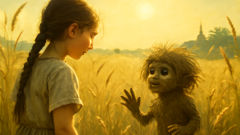
The next morning, the drought broke. Clouds rolled in, heavy and dark, and the rain fell in silver sheets. The villagers cheered, certain the spirits had been appeased. But for Alyona, something had changed. She began to notice things no one else did—a circle of flattened grass in the rye, stones arranged in patterns she didn’t remember making, and sometimes, a shadow flitting just beyond her vision. Curiosity gnawed at her. One midday, unable to resist, Alyona ventured into the fields at the forbidden hour. The sunlight was blinding, the wheat humming with bees and heat. She wandered farther than ever before, following a trail of tiny footprints pressed into the earth. Suddenly, the world shifted. The path behind her vanished; every direction looked the same, an endless, swaying golden maze. Panic flared—she was lost. A chill crawled down her spine as laughter echoed around her, now less playful and more mocking. Out of the wheat stepped a figure no higher than her knee: a Polevik. Its face was ancient, eyes glittering black like seeds, body covered in moss and dust. It grinned, showing tiny, sharp teeth. "Why do you trespass, girl? This is our hour." Alyona swallowed her fear. "I meant no harm. I only wanted to understand." The Polevik circled her, inspecting. "Few humans are so bold—or so foolish." It gestured to the wheat. "The field is alive. Respect it, and we may let you go." Alyona nodded quickly, offering a handful of wildflowers she had picked. The Polevik snatched them, sniffed, and smiled. "You listen better than most. Remember: the land is not yours alone." In a blink, the spirit vanished. The wheat parted, revealing the path home.
From that day, Alyona sensed a new connection to the fields. She left gifts—a thimbleful of milk, a song whispered into the breeze—and in return, her family’s wheat stood taller, richer than any other. When storms threatened, her roof held firm; when wolves prowled, they kept to the woods. But she never forgot the warning in the Polevik’s eyes. She told no one of her encounter, yet watched as others in the village began to forget their old rituals, growing careless as the harvest neared. One evening, as dusk painted the fields in molten gold, Alyona found her younger brother missing. Panic seized her. She raced through the wheat, calling his name. The air shimmered with heat and shadow. Suddenly, she stumbled upon another Polevik—this one older, with silver grass hair and a cloak woven from mouse tails. It stood over her brother, who sat entranced, weaving garlands from wild oats. "He is innocent," the Polevik intoned, "but your people forget too much. Remind them, or the land will take what is owed." Alyona begged for her brother’s return, promising to restore the village’s respect for the spirits. The Polevik nodded, vanishing into the dusk, leaving the boy blinking as if waking from a dream. That night, Alyona gathered her family and told them everything. Some doubted, some wept, but all agreed to revive the old ways: songs at sunrise, offerings at new moon, thanks given for every loaf of bread. As the harvest came in—fuller and sweeter than any in memory—the villagers once again felt the silent presence of the Polevik. Their laughter echoed in the fields at dusk, no longer mocking but mingled with the soft rustle of wheat—a reminder that in Russia’s vast heartland, humans and spirits must walk side by side.
The Bargain at Twilight
The days shortened as summer waned, and Alyona felt the weight of her secret pact with the Polevik settle over her like a heavy cloak. Though her family had returned to honoring the old traditions, not all in the village were so diligent. Some of the younger men mocked the rituals, preferring to trust in plows and steel rather than spirits. As autumn approached, rumors spread of sickles snapping without cause, of strange illnesses sweeping through barns, and of harvest carts overturning on clear nights. Alyona knew the Polevik were growing impatient. One evening, as the sky bled red behind drifting clouds, she walked to the edge of the field where the wheat met the wild steppe. She carried an offering: honeyed bread wrapped in linen, a silver button from her mother’s wedding dress, and a small painted egg. Kneeling, she whispered, "To the guardians of this land—may we share its gifts in peace." A cold wind rose, stirring the wheat. Shadows gathered in the furrows. The ground seemed to ripple as a council of Polevik emerged—five in all, each different: one with bark-like skin, another crowned in wildflowers, a third draped in spiderwebs, the fourth with glowing eyes like coals, and the fifth so old its features blurred into the earth itself. The eldest spoke in a voice like rustling leaves. "Child, you keep your word, but others do not. The balance frays." Alyona pleaded, "Give us time. Let me show them your power and your kindness." The spirits considered her request. The one crowned with wildflowers stepped forward, touching Alyona’s hand with a touch as cool as dew. "We will wait," it whispered, "but only until the final harvest moon." The council vanished, leaving Alyona shivering in the deepening dusk.
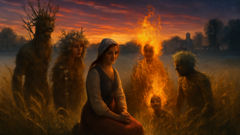
Determined to honor her promise, Alyona set about teaching the children new songs—old prayers spun into lullabies, tales of the Polevik woven into bedtime stories. She painted small wooden charms and left them at the crossroads. Gradually, the mood in Kamenka shifted. Elders smiled at Alyona’s efforts, telling their own stories by firelight. The skeptical youths remained stubborn. Then, one night under a swollen harvest moon, disaster struck. A sudden storm swept over the fields, flattening wheat and tearing roofs from houses. Lightning set a hayrick ablaze. In the chaos, the villagers saw strange forms dancing at the field’s edge—shapes half-hidden by rain and shadow, laughing as they leapt from sheaf to sheaf. When dawn came, half the harvest was ruined.
Grief and fear rippled through the village. Some blamed Alyona for angering the spirits; others begged her to intercede. Summoning her courage, she returned alone to the battered fields. The Polevik awaited her in a ring of scorched earth. "You failed us," the oldest accused. Alyona bowed her head. "I tried. Some hearts are closed." The Polevik regarded her in silence, then the one with glowing eyes spoke: "You alone have honored us. For your sake, we will spare your home and kin. But let all remember: forget us again, and the land will turn against you." With that, they vanished into the mist. When Alyona returned to her cottage, she found her family’s stores untouched by storm or fire.
Word of this miracle spread swiftly. The villagers humbled themselves, rebuilding what was lost and restoring every old custom with newfound zeal: before every meal, a crumb for the Polevik; before every song, a verse for the earth; before every planting, a prayer to unseen hands. Seasons passed, and while hardship still came, it never lingered. The fields grew thick and bright each year, and the Polevik—no longer feared—became protectors in local memory. Alyona grew into a wise woman, her tale handed down as both warning and blessing. In time, even skeptics began to leave offerings at field’s edge, grateful for the mysterious guardians who had shaped their fate.
Conclusion
The legend of the Polevik endures not because of terror or superstition, but because it speaks to the unbreakable connection between people and the land that feeds them. In Kamenka, long after Alyona’s hair turned silver and children’s laughter replaced old fears, the villagers continued their rituals—not out of dread, but gratitude. Each rustling breeze in the wheat became a gentle reminder that every harvest is a gift earned not only through sweat and toil, but through respect for mysteries far older than plows or kings. Travelers who visit those fields today still hear tales of small figures darting at the edge of vision when the sun is low or the mist thickens at dawn. Some claim to catch glimpses of moss-haired dwarves or hear faint laughter carried on the wind. Whether or not the Polevik truly linger, their presence endures in every careful offering, every blessing whispered before planting, every song shared at sunset. In honoring the field spirits, Alyona’s people learned to see themselves as stewards rather than owners of the land. They discovered that wisdom and kindness—not fear—were the true currency of peace with the unseen world. And so, as generations pass and fields turn from green to gold and back again, the story of Alyona and the Polevik is retold—an eternal lesson in humility, wonder, and respect for all that grows beneath the endless Russian sky.

